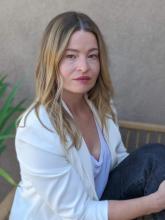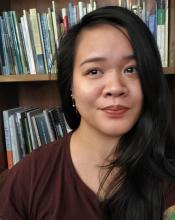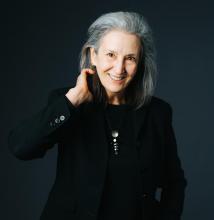Drumroll please! We announce the winners of the 2020 International Literary Awards in Poetry & CNF*!
(*Winners in Fiction will be announced at a later date.)
Winners in each category receive a cash award of $1,000.
Honorable mentions in each category receive a cash award of $150.

Chelsea Bunn is the author of Forgiveness (Finishing Line Press, 2019), which was a finalist for the New Mexico/Arizona Book Award and a semi-finalist in the New Women’s Voices Chapbook Competition. Her work appears in Best New Poets, Maudlin House, Dunes Review, Georgetown Review, and elsewhere. She earned her MFA in Poetry and her BA in English at Hunter College, where she received a teaching fellowship, a Norma Lubetsky Friedman Scholarship, and was twice awarded the Academy of American Poets Catalina Páez & Seumas MacManus Prize. Born and raised in NYC, she currently lives and teaches in New Mexico.

Maria Isabelle Carlos' work has appeared or is forthcoming in Tin House Online, Pleiades, Hayden’s Ferry Review, Sycamore Review, Cave Wall, Four Way Review, and elsewhere, and has been nominated for a Pushcart Prize and Best of the Net. She received her B.A. in English at the University of North Carolina at Chapel Hill, and is currently an M.F.A. candidate in poetry at Vanderbilt University. She serves as editor-in-chief of Nashville Review and Inch.
An unfortunately all too ordinary moment is transformed by the speaker’s seemingly simple retort to an instance of sexual harassment. The world of this poem reveals all the intensity and power of this brief moment. Half-rhymes in particular propel the action of the poem. The speaker is emboldened by her “pink-faced pit bull bitch” whose “coat [traps] the sun” and senses the anger that “smolders on her tongue.” “All” of the speaker’s “pent-up silent selves, all those / bitches [she] held back” are here unleashed.
- “Infertile, Period.” by Ra Avis
- “How I Remember” by Gwyneth Bradbury
- “Planned Parenthood Abecedarian” by Chelsea Bunn
- “Copper Age” by Chelsea Bunn
- “Catcalled While Running With My Dog” by Maria Isabelle Carlos
- “Endometriosis is Not a Metaphor” by Natalie D-Napoleon
- “When You Need To Start Again” by Natalie D-Napoleon
- “Initials” by Sally Lipton Derringer
- “Grocery List for Mom” by Cortney Esco
- “exordium” by Aimee Herman
- “On Becoming a Moirologist” by Elizabeth Hoover
- “Radiation” by Whittney Jones
- “November, End of the Decade” by Amelia Martens
- “Castaway” by Ellen Birkett Morris
- “The Apology” by Rachel Marie Patterson
- “I Am Trying Not To Love You Less” by Claire Scott
- “For Cecil and Other Negroes” by Lamaya Williams
- “Well-Meaning White Women” by Lamaya Williams
Maria Isabelle Carlos' work has appeared or is forthcoming in Tin House Online, Pleiades, Hayden’s Ferry Review, Sycamore Review, Cave Wall, Four Way Review, and elsewhere, and has been nominated for a Pushcart Prize and Best of the Net. She received her B.A. in English at the University of North Carolina at Chapel Hill, and is currently an M.F.A. candidate in poetry at Vanderbilt University. She serves as editor-in-chief of Nashville Review and Inch.

Renata Golden has an MFA in creative nonfiction from the University of Houston and lives in Santa Fe, New Mexico. Her work has been nominated for Pushcart Prizes and was finalists for the 2018 Annie Dillard Award for Creative Nonfiction and the Center for Documentary Studies at Duke University (2017). Her essays were published in Chautauqua Literary Journal, About Place Journal, Terrain.org, MUSE/A Journal, and Creative Nonfiction/True Story. An essay about bluebirds and motherhood is forthcoming in an anthology from Cornell University Press. “Portal” is from a work in progress titled A Thin Place: The Nature of the Chiricahua Mountains.
In gorgeous prose, the reader is transported to a summer in the Philippines where the narrator tries to fit in with extended family and fill in the gaps of history in the place where they were not raised. Full of rich, vivid details of domestic life, especially food, this is a luminous piece about loss and hope, centering on the importance of language, connections, and family. Most of all, it is a deeply-felt story of longing and wanting to belong.
I kept coming back to this piece, both for the language, which is lyrical and memorable, as well as the story, which is the simplest story of all: love. But the writer expands on the definition of love, learning to love themselves even in the absence of the companion the narrator calls simply No Word. Some things resist definition, are everything and nothing. Love is also landscape, having a home of your own, having solitude, being called to a place as if by “a song I recognized, although I didn’t know the words.”
- “Laughing in the Bushes” by Sarah Cadorette
- “From the River” by Maria Isabelle Carlos
- “Moon Faces” by May-Lee Chai
- “Yucca Brevifolia” by Natalie D-Napoleon
- “People Change Sometimes” by Kim Diaz
- “Portal” by Renata Golden
- “Life and Death: A Diptych” by Kathy Kehrli
- “Rhapsody on the FM” by Tristan Marajh
- “Sweatpants” by Emily Ramser
- “The Fox” by Catherine Raven
- “Voice Unbound” by Amy Reardon
- “The Year the Gate Went Up” by Eva Recinos
- “We were made for these times” by Masha Shukovich
- “My Father, Bàba, in Proverbs” by Jen Soong
- “Brackish Breath” by Shana Turner
This poem’s form is a kind of field that invites multiple ways to read, either down or across the page, and led me through its sound and especially its imagery, into its increasing strangeness. A birth control implant, described initially and innocently as a “metal t” or “Little cross,” a kind of amulet, quickly “[blooms]” into a verdant and bewitching realm of “cupreous blood” and “copper branches.” I felt captivated in the crosshairs of this poem’s desire.